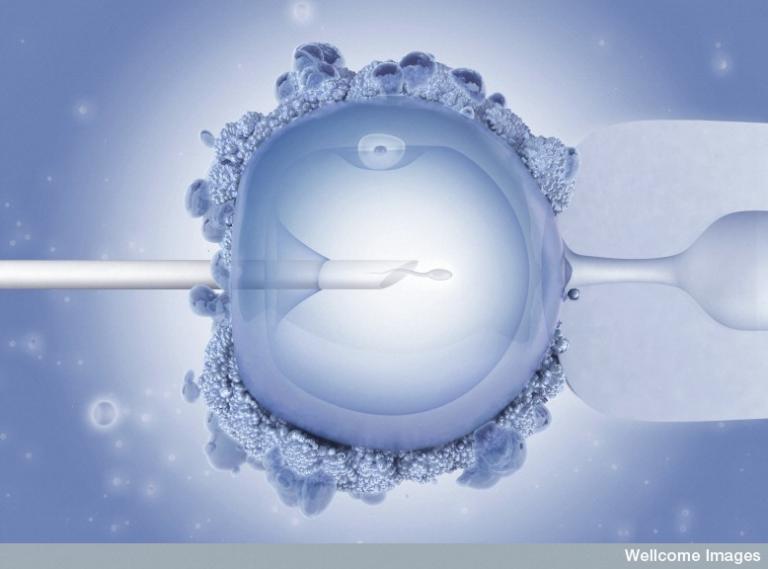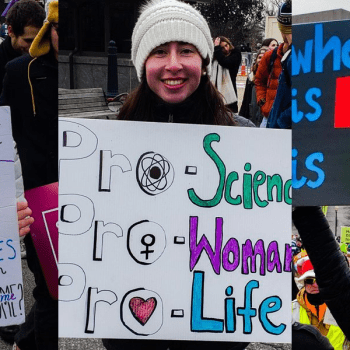
Credit: Maurizio De Angelis. Wellcome Images
[email protected]
http://images.wellcome.ac.uk
Early this morning, there was a shocking announcement out of China. They performed gene editing on humans, and a woman had gotten pregnant with genetically edited babies. I want to note this, then discuss the moral and practical problems.
AP carried the story as an exclusive:
A Chinese researcher claims that he helped make the world’s first genetically edited babies — twin girls born this month whose DNA he said he altered with a powerful new tool capable of rewriting the very blueprint of life. […]
The researcher, He Jiankui of Shenzhen, said he altered embryos for seven couples during fertility treatments, with one pregnancy resulting thus far. He said his goal was not to cure or prevent an inherited disease, but to try to bestow a trait that few people naturally have — an ability to resist possible future infection with HIV, the AIDS virus.
Moral Issues with Gene Editing
Even the AP story includes some ethical concerns over this.
Some scientists were astounded to hear of the claim and strongly condemned it.
It’s “unconscionable … an experiment on human beings that is not morally or ethically defensible,” said Dr. Kiran Musunuru, a University of Pennsylvania gene editing expert and editor of a genetics journal.
“This is far too premature,” said Dr. Eric Topol, who heads the Scripps Research Translational Institute in California. “We’re dealing with the operating instructions of a human being. It’s a big deal.”
However, one famed geneticist, Harvard University’s George Church, defended attempting gene editing for HIV, which he called “a major and growing public health threat.”
“I think this is justifiable,” Church said of that goal.
I am more of the school of Musunuru and Topol, not Church.
Catholic Teaching on Gene Editing
The Catholic Church has not forbidden gene editing completely but we condemn any editing that would be added passed on to further generations. Even US law note this distinction. AP explains, “It’s only recently been tried in adults to treat deadly diseases, and the changes are confined to that person. Editing sperm, eggs or embryos is different — the changes can be inherited. In the U.S., it’s not allowed except for lab research.”
The reasons for Church teaching are explained in Dignitas Personae 26:
For a moral evaluation the following distinctions need to be kept in mind. Procedures used on somatic cells for strictly therapeutic purposes are in principle morally licit. Such actions seek to restore the normal genetic configuration of the patient or to counter damage caused by genetic anomalies or those related to other pathologies. Given that gene therapy can involve significant risks for the patient, the ethical principle must be observed according to which, in order to proceed to a therapeutic intervention, it is necessary to establish beforehand that the person being treated will not be exposed to risks to his health or physical integrity which are excessive or disproportionate to the gravity of the pathology for which a cure is sought. […]
The moral evaluation of germ line cell therapy is different. Whatever genetic modifications are effected on the germ cells of a person will be transmitted to any potential offspring. Because the risks connected to any genetic manipulation are considerable and as yet not fully controllable, in the present state of research, it is not morally permissible to act in a way that may cause possible harm to the resulting progeny. In the hypothesis of gene therapy on the embryo, it needs to be added that this only takes place in the context of in vitro fertilization and thus runs up against all the ethical objections to such procedures. For these reasons, therefore, it must be stated that, in its current state, germ line cell therapy in all its forms is morally illicit.
Thus in 2008 (when this was published), the Vatican said wait till further notice on safety before anything that could affect more than an individual patient. ANd we Catholics are whole-heartedly against IVF which is the main way this is done early in life.
Gene Editing Isn’t Easy
AP reported this research used CRISPR-cas9:
In recent years scientists have discovered a relatively easy way to edit genes, the strands of DNA that govern the body. The tool, called CRISPR-cas9, makes it possible to operate on DNA to supply a needed gene or disable one that’s causing problems.
Originally scientists thought CRISPR was a precision tool but this summer a report came out showing it had many unexpected side effects. The issue was that at first they only looked right near the gene they were modifying but it would edit parts of the genome far away. So far we can’t control this.
CRISPR Causes Random Additions and Deletions
New Scientist reported in July:
A study of CRIPSR suggests we shouldn’t rush into trying out CRISPR genome editing inside people’s bodies just yet. The technique can cause big deletions or rearrangements of DNA, says Allan Bradley of the Wellcome Sanger Institute in the UK, meaning some therapies based on CRISPR may not be quite as safe as we thought. […]
In studies of mice and human cells, Bradley’s team has found that in around a fifth of cells, CRISPR causes deletions or rearrangements more than 100 DNA letters long. These surprising changes are sometimes thousands of letters long. […]
“There’s a risk of causing cancer sometime in a patient’s lifetime,” says Bradley. “We need to understand more before rushing into human clinical trials.”
“I do believe the findings are robust,” says Gaetan Burgio of the Australian National University, an expert on CRISPR who has debunked previous studies questioning the method’s safety. “This is a well-performed study and fairly significant.”
Hence, despite a bit of fanfare for CRISPR it is not safe enough for human use that might be inherited. This goes back to the Vatican’s statement about “in the present state of research” we can’t use this.
Not Now and Probably Not Ever
Given that gene editing is such a difficult and precise operation, I’m thinking it will always be difficult and prone to random errors when done on the large scale of a whole developed human body. It could be done on an early zygote but that implies IVF which is immoral. If done in an IVF setting, it is likely to produce extra babies they throw away because the procedure didn’t work perfectly on them. This is a form of ableism.
I think the Vatican is right to currently have a moratorium on such treatments on embryos or germ cells of developed humans. I suspect that at least in my lifetime we will not know enough to end that moratorium. We need to see the value in humans that are seen as otherwise imperfect and not try to play with our genes.
Updates
November 27
MIT Technology Review reported that even in China, this raised some concerns and He Jiankui is under investigation.
A Chinese researcher who claims to have created the first gene-edited babies, He Jiankui of the Southern University of Science and Technology (SUST), in Shenzhen, is now facing investigation over whether the experiment broke Chinese laws or regulations. […]
On Sunday, the Shenzhen City Medical Ethics Expert Board said it would begin an investigation of He’s research and released a statement saying that HarMoniCare “according to our findings … never conducted the appropriate reporting according to requirements.” The former medical director of the private hospital, Jiang Su-Qi, told Southern Capital News he had no recollection of approving He’s research while he was on its ethics committee.
“These two children are the guinea pigs. They will go through their whole maturing process having not understood the risks ahead of time,” said Liu Ying of Peking University’s Institute of Molecular Medicine.
November 28
The NIH condemned this action in no uncertain terms:
This work represents a deeply disturbing willingness by Dr. He and his team to flout international ethical norms. The project was largely carried out in secret, the medical necessity for inactivation of CCR5 in these infants is utterly unconvincing, the informed consent process appears highly questionable, and the possibility of damaging off-target effects has not been satisfactorily explored. It is profoundly unfortunate that the first apparent application of this powerful technique to the human germline has been carried out so irresponsibly.
If you like what you see, please sponsor me on Patreon. I get very little from my online writing and want to do my fair share to help my religious community. Even $2 a month helps.












